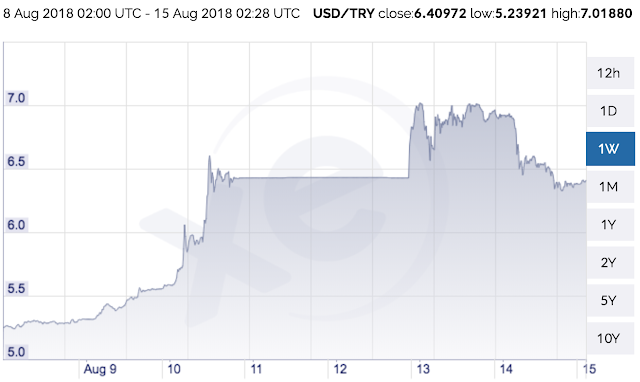Although Turkey has multiple causes to its latest currency crisis, one feature that stands out is its current account deficit. In short, what a current account deficit means is that a given country is a net borrower from abroad. The current account includes three parts: the trade deficit, net primary income from abroad, and net cash transfers.
CA = (X-M) + NY + NCT
In spite of what President Trump has to say on the topic, trade deficits are not a bad thing. It is not so much that Turkey is running a deficit, but rather the size of the deficit and an inability to pay back the deficit incurred. Turkey's current account deficit has widened to 5 percent, which, as the International Monetary Fund [IMF] points out in its most recent Article IV Consultation (released in April), is higher than its peers (IMF, p. 4). Then there is the currency depreciation that caused the inflation (IMF, p. 5). Not only did this sharp currency depreciation fuel inflation, but it put pressure on local banks and undermined economic growth (Bloomberg). Turkey's projected growth for 2018 dropped from 7.4 percent to 4.8 percent, a projection that Fitch pointed out during its credit rating downrating of Turkey. Standard and Poor's followed suit in downgrading its credit rating this year and deepening Turkey's junk bond status, citing the volatility of Turkey's exchange rate and deteriorating outlook on its inflation.
Turkey's external financing needs for this year amount to $200 billion (or 25 percent of its GDP), and as such, Turkey is going to need the backing from an organization such as the IMF that could finance the current account deficit. The problem is that Turkish President Recep Tayyip Erdoğan is probably going to ask for help. I'm not saying it's impossible. After all, Argentina historically has a relationship with IMF that could hardly be considered smooth sailing. If anything, it was nothing short of a miracle that Argentina was able to sit down with the IMF and negotiate a three-year stand-by agreement. Nevertheless, Erdoğan probably will not ask the IMF for help. This goes beyond looking weak or incompetent after recently winning the presidential election. Asking the IMF for help would mean repairing damaged relationships with the United States, who happens to be the IMF's primary backer. President Trump doubling Turkish steel tariffs and the politics behind Pastor Andrew Brunson's imprisonment indicate that U.S.-Turkish tension is not likely to abate anytime soon.
What happens if Erdoğan doesn't feel like going to the IMF? He has a few other options, but they are not going to be pretty. Erdoğan could raise interest rates to help the fact that Turkey has a low savings rate (IMF, p. 26), except that he considers high interest rates "the mother of all evil." There is the possibility of a currency board to get Turkey out of this mess, but there is concern over whether Turkey has the theoretical conditions to make it a reality. Bloomberg already dismissed the possibility of capital controls working for Turkey because, as economist John Cochrane points out, government debt is the problem. What will Turkey do? That is a good question, and largely up to Erdoğan. If the European Central Bank and Bank of Japan are indicative of anything, it could be the path of least resistance. Erdoğan has some political incentive to not shake things up too badly, but given the direction it is heading, that wouldn't be the wisest decision. The longer that Turkey waits to do something significant, the more likely Turkey sets it up for failure, as well as be more likely to trigger a global economic disaster.


No comments:
Post a Comment